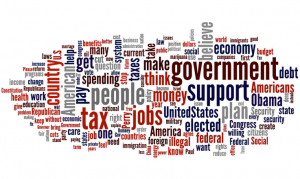
We have another Republican presidential debate to watch tonight, Save Jerseyans (BTW – be sure to follow our Twitter page @SaveJersey tonight beginning at 8:00PM for #CNNDebate live tweets).
And if the last few debates are any guide, CNN’s “Western” leg will feature questions on topics including border walls, compulsory vaccinations, and “creating jobs” (whatever the hell that means). The candidates will also talk a lot about tax reform thanks to Herman Cain’s gutsy yet controversial 9-9-9 proposal.
 But one topic, curiously enough, seems to have eluded the field’s focus in recent weeks: shrinking the size and scope of the federal government! You remember: the thing we held those “tea parties” over last year?
But one topic, curiously enough, seems to have eluded the field’s focus in recent weeks: shrinking the size and scope of the federal government! You remember: the thing we held those “tea parties” over last year?
Yes, we’ve discussed dismantling Obamacare at every debate. That’s still only one piece of the pie. A big piece, to be sure. But government spending was out of control long before Obama, Pelosi and Reid threw a rager and finally busted our credit rating. So why are all of the candidates talking about tax cuts?
Don’t get me wrong. Ultimately, tax reform is a hugely important step in saving our republic from decline. No doubt about it! We can’t long survive as a country where half of the citizenry hold no financial stake in its operation, nor as a global competitor with the highest corporate tax rates of any industrial nation. On the micro level, throwing good money after bad succeeds at nothing but depriving the private sector of job creating investment capital and retail chains of revenue-generating sales. We know that government can’t create jobs; it can kill them by raising taxes.
The only problem with a platform centered on tax reform is that tax cuts alone won’t get us to the promised land, Save Jerseyans.
We tried a tax cuts only strategy last decade. It failed. President G.W. Bush and a post-9/11 Republican majority lowered rates in 2003 and, to the chagrin of liberal pseudo-intellects everywhere, increased federal tax revenues by $785 billion between 2004 and 2007. What they neglected to do was cut spending. That left the country over-leveraged, under-capitalized, and extremely vulnerable to a cyclical economic downturn exacerbated by the largest government expansion since last great depression under President Obama.
But my concern here isn’t academic or historical. Pragmatism needs to rule the day.
We need to beat Obama next year to make tax reform (or any reform!) a near-term possibility. Everything hinges on it. Towards that end, we need to be cognizant of the reality that any serious Republican tax reform proposal will raise taxes on someone. It’s hard to avoid when nearly half the country is already paying nothing! It’s also a rhetorical handicap that’s exactly what the liberal media and the Democrat Party would love to run against in 2012. Class warfare is their weapon and they know how to use it.
My two cents? The Grand Old Party needs to stick with what works and avoid easily-discernible traps. Recent successes provide a clear path to large and sustainable majorities. The Tea Party changed Washington in 2010 by uniting Americans against government excess. Politicians like Paul Ryan, Chris Christie and Scott Walker gained iconic status over the past two years by innovating and implementing bold strategies to reduce government’s crushing and intrusive role in our lives.
Reigning in government needs to be the most important theme for our nominee in 2012, too.
9-9-9 can wait for the first $999 billion in cuts.



Why can't we have both? Cut taxes and spending in the same bill. The democrats did two at both all the time! It'd still be more concise legislation than Obamacare.
You can depending on thr final spending reduction amount. Even 999 plus Paul Ryan's plan wouldn't bring spending down quick enough to account for the shortfall. Need to proceed gradaully in my opinion. Otherwise we'll face a second downgrade and end up paying a higher interest rate on u.s. debt.
Without tax reform we will never get spending cuts. We need to fix how we spend our tax revenue and wisely spend it. First it is to figure how much we take in and how much we need hence tax reform. If we figure that we need to maintain our military spending, and we should, then we need to decide what else we require as country and back into our revenue base in that manner. Secondly, we need to decide how much we want our politicians to earn and if they should have staff paid by the taxpayers and of course their benefits and pensions, I vote no on their having paid for staff and free benefits and pensions. That is how you get spending under control.
Let me pose a question to you, Bruce. I'm not sure of the answer myself:
Can a Republican nominee for President of the United States run (and win) in 2012 with a platform centered around a tax plan — inarguably better than the current system — that would nevertheless increase taxes on a significant portion of the population (b/c they're paying very little to begin with) and institute a first-ever national, regressive sales tax?
I'm all about ending the redistribution of wealth in our society but wow, I don't know if we have anyone who can sell it!
What do you think?